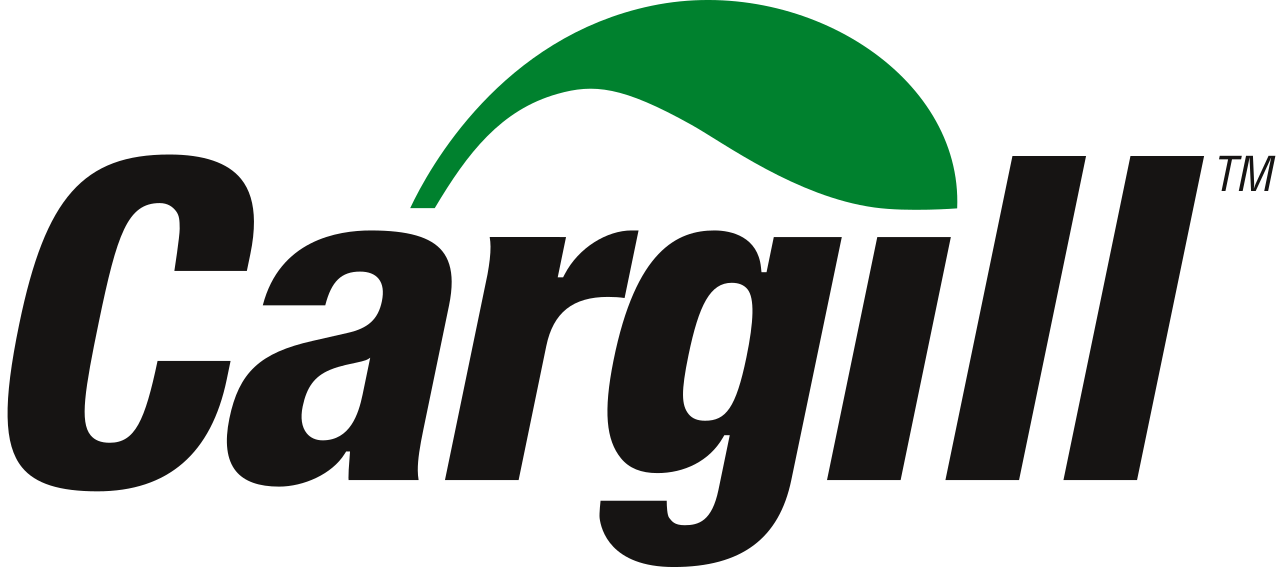Global Agrivoltaics Market, By System, By Crop Type, By Mounting Type, By Application, By Region & Segmental Insights Trends and Forecast, 2023 – 2034
- Industry: Agriculture
- Report ID: TNR-110-1303
- Number of Pages: 420
- Table/Charts : Yes
- September, 2024
- Base Year : 2024
- No. of Companies : 10+
- No. of Countries : 29
- Views : 10179
- Covid Impact Covered: Yes
- War Impact Covered: Yes
- Formats : PDF, Excel, PPT
Agrivoltaics, also known as agrophotovoltaics, is the innovative practice of combining solar energy production with agricultural activities on the same land. This approach optimizes land use by enabling both farming and energy generation, contributing to sustainability. The agrivoltaics market is expanding due to the growing demand for renewable energy and sustainable farming.
Applications include integrating solar panels in crop fields, orchards, and livestock farms. A notable example is a project in Germany’s Heggelbach farm, launched in 2016, where solar panels were installed above crops, boosting energy production while maintaining crop yield. In Japan, since 2013, agrivoltaic systems have been implemented to support small-scale farmers by generating additional income from solar power. End users, such as farmers, benefit from increased revenue streams, reduced carbon footprints, and enhanced crop resilience to climate variability. In terms of revenue, the global agrivoltaics market was worth US$ 3.23 Bn in 2023, anticipated to witness CAGR of 11.2% During 2024 – 2034.
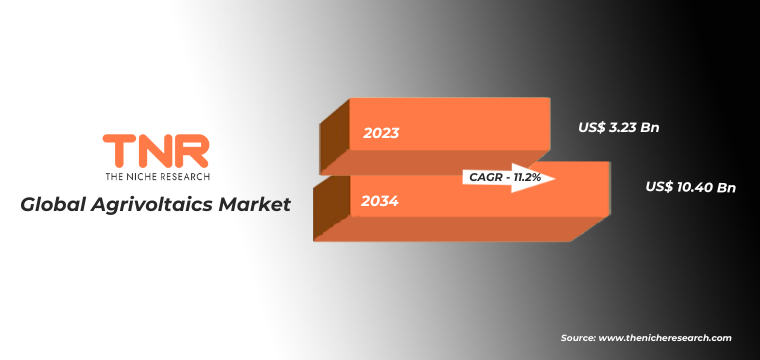
Growth Drivers of Global Agrivoltaics Market
- Rising Demand for Renewable Energy and Sustainable Agriculture: The global push for renewable energy is driving the growth of the agrivoltaics market. As countries aim to reduce carbon emissions, agrivoltaic systems are increasingly being adopted to combine energy generation with sustainable agriculture. For example, Japan has been investing in agrivoltaics since 2013, with the Shizen Energy project integrating solar panels with crop production. This approach supports farmers by providing an additional revenue stream from energy production, while maintaining crop yield. As governments worldwide promote clean energy initiatives, agrivoltaics is becoming an essential solution for optimizing land use and reducing environmental impact.
- Climate Change Resilience and Agricultural Protection: Agrivoltaic systems offer farmers a way to protect crops from extreme weather while generating electricity. The shade provided by solar panels can reduce heat stress and improve water retention in soil, helping crops survive in areas affected by climate change. A notable example is the 2016 Heggelbach farm project in Germany, where solar panels shielded crops from excessive sunlight, improving resilience during heatwaves. This dual benefit of energy production and agricultural protection is a key driver for agrivoltaics adoption, especially as climate-related challenges intensify globally.
Technology Analysis of Agrivoltaics:
| Technology Component | Description | Example | Benefits |
| Photovoltaic (PV) Panels | Solar panels used to convert sunlight into electricity, typically installed above or alongside agricultural land. | Heggelbach Farm, Germany (2016): PV panels were installed above crops like potatoes and wheat. | Dual land use for energy generation and farming. – Energy cost savings. – Provides shade, which can protect crops from excessive sunlight and heat. |
| Bifacial Solar Panels | Panels that absorb sunlight from both sides, increasing efficiency by capturing reflected light from the ground. | Shizen Energy, Japan (2013): Bifacial panels used in vegetable farms to increase energy generation. | Increased solar energy efficiency. – Optimized land use, particularly beneficial for low-light conditions. – Additional energy generation from light reflected off crops or soil. |
| Dynamic Solar Panel Systems | Panels that adjust their orientation to follow the sun’s path, optimizing both energy production and light exposure for crops. | Sun’Agri, France (2020): Dynamic panels move to provide optimal sunlight for vineyards. | Maximizes energy production throughout the day. – Can be adjusted to protect crops from excessive sunlight or frost. – Enables precision farming in sunlight management. |
| Semi-Transparent Solar Panels | Panels that allow partial sunlight to pass through, providing light for crops while still generating electricity. | Toshiba, Japan (2020): Semi-transparent solar panels used in rice fields to allow both sunlight and power generation. | Crops receive necessary sunlight for growth. – Energy generation while maintaining full crop productivity. – Aesthetic appeal and efficient space use in greenhouses or crop fields. |
| Thin-Film Solar Cells | Lightweight and flexible solar cells that can be applied to various surfaces, including greenhouses and irregular structures. | Solaris Agrivoltaics, Italy (2021): Thin-film solar cells applied to greenhouse rooftops. | Flexibility in application on diverse surfaces. – Less intrusive compared to traditional panels, maintaining more light for crops. – Lower weight load, making them suitable for rooftops. |
| Concentrated Solar Power (CSP) | Mirrors or lenses concentrate sunlight onto a small area to generate high-temperature heat for electricity production. | California, U.S. (2017): CSP technology tested in combination with farming near solar power plants. | High efficiency in energy generation. – Possible application in remote areas with limited space. – Potential integration with large-scale farming operations. |
Global Agrivoltaics Market Revenue & Forecast, (US$ Million), 2016 – 2034
Global Agrivoltaics Market By System
In 2023, dynamic systems dominated the global agrivoltaics market, accounting for 50.2% of the market’s revenue share. These systems, which adjust the angle of solar panels to follow the sun’s path, optimize both energy generation and crop growth. An example of this technology is the Sun’Agri project in France, where dynamic solar panels were installed over vineyards in 2020. The system allows panels to move in real-time, adapting to the specific needs of crops, such as providing shade during intense sunlight or maximizing exposure during cooler periods, making it a highly efficient solution for sustainable farming and energy production.
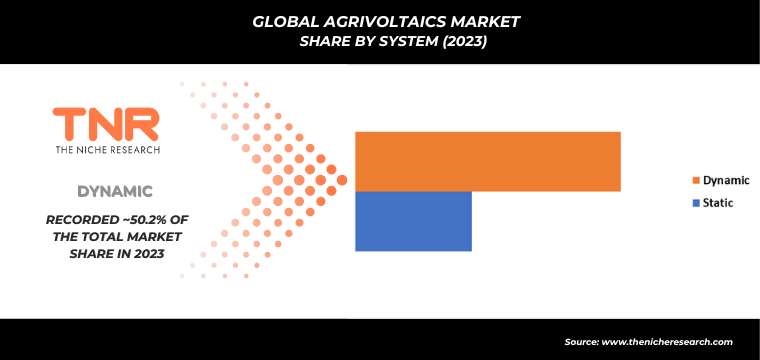
Global Agrivoltaics Market By Crop Type
Herbs and medicinal plants are expected to experience the fastest growth in the agrivoltaics market during the forecast period. These plants thrive under partially shaded conditions, making them ideal for cultivation beneath solar panels. In Japan, a 2020 agrivoltaic project focused on growing medicinal herbs like ginseng under semi-transparent solar panels, which provided the right balance of sunlight for plant growth while generating renewable energy. This dual-purpose system not only enhances plant health and yield but also boosts income for farmers, as demand for natural and medicinal products continues to rise globally, fueling further adoption of agrivoltaics in this segment.
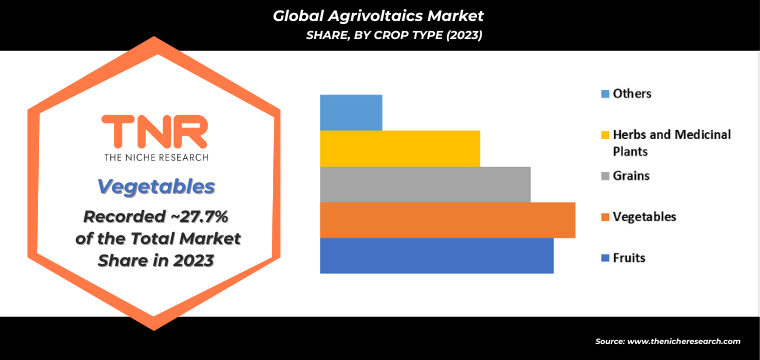
Global Agrivoltaics Market By Mounting Type
Ground mounted agrivoltaics led the global market in 2023 with a revenue share of 78.1%. These systems involve installing solar panels directly on agricultural land, allowing for large-scale energy generation while maintaining crop cultivation. For instance, in 2016, Germany’s Heggelbach farm successfully implemented a ground-mounted agrivoltaic system, where solar panels were strategically placed above crops like potatoes and wheat. This setup maximized land use efficiency, providing shade for crops while producing renewable energy. The widespread adoption of ground-mounted systems is driven by their flexibility, scalability, and suitability for various agricultural environments, making them a dominant solution in the market.
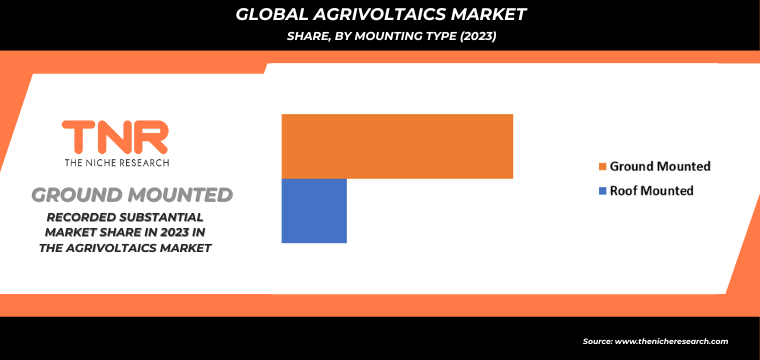
Global Agrivoltaics Market By Application
In 2023, orchards captured 15.8% of the revenue share in the global agrivoltaics market and are projected to be the fastest-growing segment. The integration of solar panels into orchards not only optimizes land use but also enhances crop protection. For instance, in 2020, Sun’Agri in France implemented agrivoltaic systems in vineyards, using dynamic panels to shield crops from excessive sunlight while generating renewable energy. This model is gaining traction in orchards, where solar panels provide shade, reduce water evaporation, and protect fruits from harsh weather. The dual benefits of energy production and improved agricultural output are driving rapid adoption in this sector.
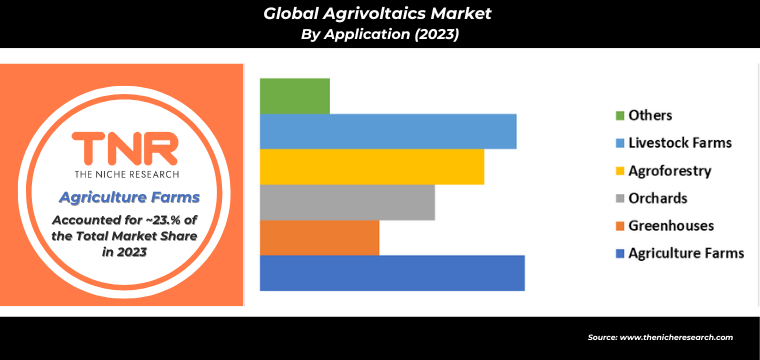
Global Agrivoltaics Market By Region
In 2023, Asia Pacific dominated the global agrivoltaics market, holding a 32.2% revenue share. The region’s leadership is driven by large-scale projects and government support for renewable energy initiatives. Japan has been a key player, with significant investments in agrivoltaics since 2013, including Shizen Energy’s project that integrates solar panels with crop cultivation. Additionally, China has rapidly expanded its agrivoltaic installations to enhance rural electrification while supporting sustainable agriculture. These countries’ focus on optimizing land use for both energy and food production has positioned Asia Pacific as the leading region in the global agrivoltaics market.
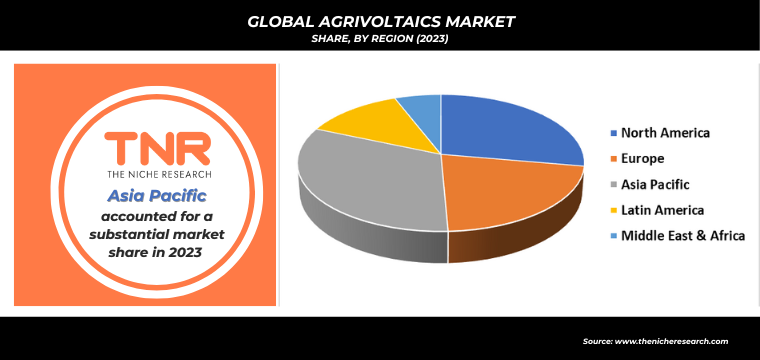
Competitive Landscape
Some of the players operating in the agrivoltaics market are
- Agrivoltaic Solution LLC
- BayWa AG
- Boralex
- Enel Green Power
- Mackin Energy
- REM TEC
- Sun Agri
- Sunrise Power Solutions
- Suntech Power Holdings
- TotalEnergies SE
- Other Industry Participants
Global Agrivoltaics Market Scope:
| Report Specifications | Details |
| Market Revenue in 2023 | US$ 3.23 Bn |
| Market Size Forecast by 2034 | US$ 10.40 Bn |
| Growth Rate (CAGR) | 11.2% |
| Historic Data | 2016 – 2022 |
| Base Year for Estimation | 2023 |
| Forecast Period | 2024 – 2034 |
| Report Inclusions | Market Size & Estimates, Market Dynamics, Competitive Scenario, Trends, Growth Factors, Market Determinants, Key Investment Segmentation, Product/Service/Solutions Benchmarking |
| Segments Covered | By System, By Crop Type, By Mounting Type, By Application, By Region |
| Regions Covered | North America, Europe, Asia Pacific, Middle East & Africa, Latin America |
| Countries Covered | U.S., Canada, Mexico, Rest of North America, France, The UK, Spain, Germany, Italy, Nordic Countries (Denmark, Finland, Iceland, Sweden, Norway), Benelux Union (Belgium, The Netherlands, Luxembourg), Rest of Europe, China, Japan, India, New Zealand, Australia, South Korea, Southeast Asia (Indonesia, Thailand, Malaysia, Singapore, Rest of Southeast Asia), Rest of Asia Pacific, Saudi Arabia, UAE, Egypt, Kuwait, South Africa, Rest of Middle East & Africa, Brazil, Argentina, Rest of Latin America |
| Key Players | Agrivoltaic Solution LLC, BayWa AG, Boralex, Enel Green Power, Mackin Energy, REM TEC, Sun Agri, Sunrise Power Solutions, Suntech Power Holdings, TotalEnergies SE |
| Customization Scope | Customization allows for the inclusion/modification of content pertaining to geographical regions, countries, and specific market segments. |
| Pricing & Procurement Options | Explore purchase options tailored to your specific research requirements |
| Contact Details | Consult With Our Expert
Japan (Toll-Free): +81 663-386-8111 South Korea (Toll-Free): +82-808- 703-126 Saudi Arabia (Toll-Free): +966 800-850-1643 United Kingdom: +44 753-710-5080 United States: +1 302-232-5106 E-mail: askanexpert@thenicheresearch.com
|
Global Agrivoltaics Market
By System
- Static
- Dynamic
By Crop Type
- Fruits
- Vegetables
- Grains
- Herbs and Medicinal Plants
- Others
By Mounting Type
- Roof Mounted
- Ground Mounted
By Application
- Agriculture Farms
- Greenhouses
- Orchards
- Agroforestry
- Livestock Farms
- Others
By Region
- North America (U.S., Canada, Mexico, Rest of North America)
- Europe (France, The UK, Spain, Germany, Italy, Nordic Countries (Denmark, Finland, Iceland, Sweden, Norway), Benelux Union (Belgium, The Netherlands, Luxembourg), Rest of Europe)
- Asia Pacific (China, Japan, India, New Zealand, Australia, South Korea, Southeast Asia (Indonesia, Thailand, Malaysia, Singapore, Rest of Southeast Asia), Rest of Asia Pacific)
- Middle East & Africa (Saudi Arabia, UAE, Egypt, Kuwait, South Africa, Rest of Middle East & Africa)
- Latin America (Brazil, Argentina, Rest of Latin America)
Report Layout:
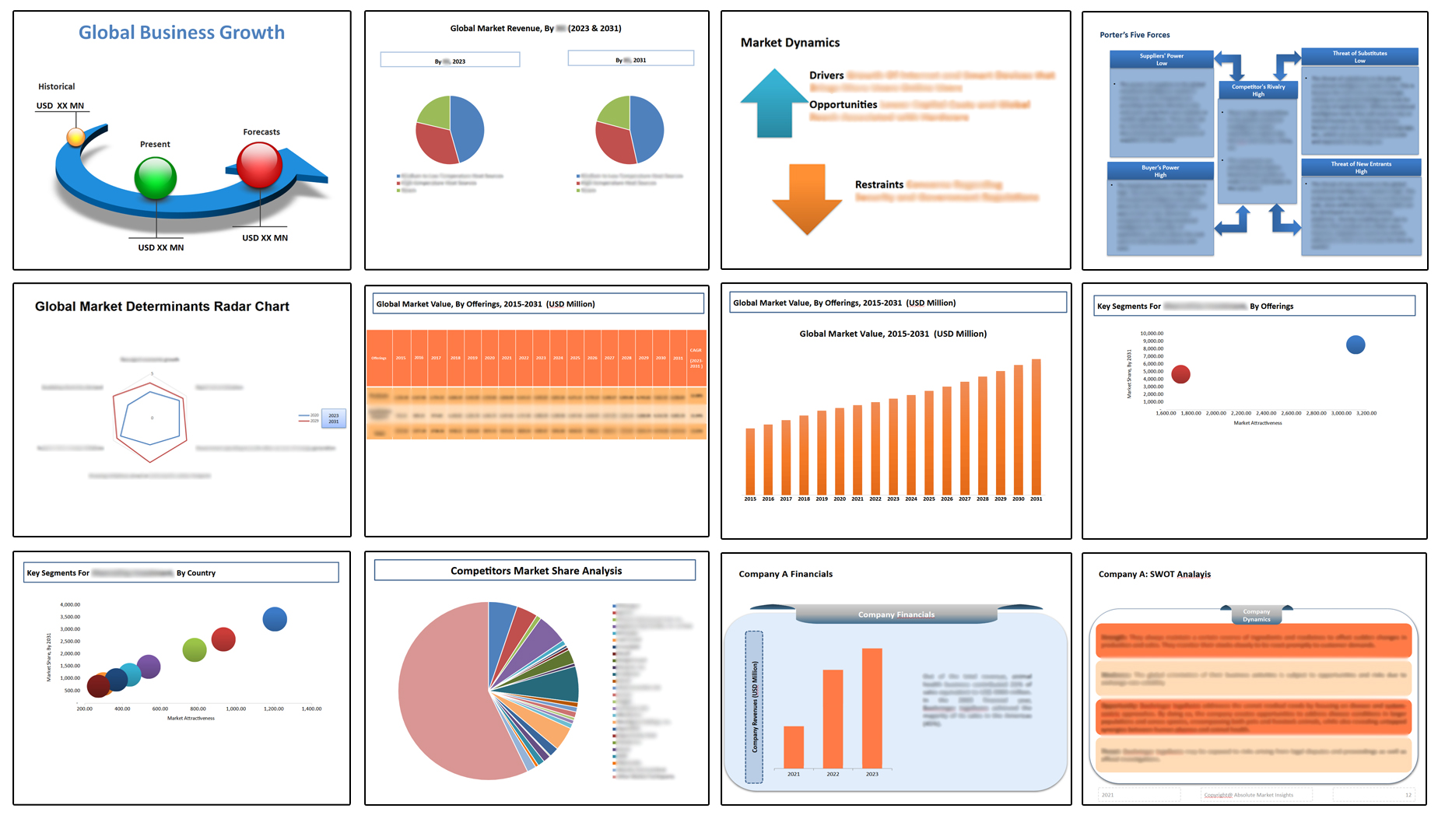
Table of Contents
Note: This ToC is tentative and can be changed according to the research study conducted during the course of report completion.
**Exclusive for Multi-User and Enterprise User.
Global Agrivoltaics Market
By System
- Static
- Dynamic
By Crop Type
- Fruits
- Vegetables
- Grains
- Herbs and Medicinal Plants
- Others
By Mounting Type
- Roof Mounted
- Ground Mounted
By Application
- Agriculture Farms
- Greenhouses
- Orchards
- Agroforestry
- Livestock Farms
- Others
By Region
- North America (U.S., Canada, Mexico, Rest of North America)
- Europe (France, The UK, Spain, Germany, Italy, Nordic Countries (Denmark, Finland, Iceland, Sweden, Norway), Benelux Union (Belgium, The Netherlands, Luxembourg), Rest of Europe)
- Asia Pacific (China, Japan, India, New Zealand, Australia, South Korea, Southeast Asia (Indonesia, Thailand, Malaysia, Singapore, Rest of Southeast Asia), Rest of Asia Pacific)
- Middle East & Africa (Saudi Arabia, UAE, Egypt, Kuwait, South Africa, Rest of Middle East & Africa)
- Latin America (Brazil, Argentina, Rest of Latin America)
The Niche Research approach encompasses both primary and secondary research methods to provide comprehensive insights. While primary research is the cornerstone of our studies, we also incorporate secondary research sources such as company annual reports, premium industry databases, press releases, industry journals, and white papers.
Within our primary research, we actively engage with various industry stakeholders, conducting paid interviews and surveys. Our meticulous analysis extends to every market participant in major countries, allowing us to thoroughly examine their portfolios, calculate market shares, and segment revenues.
Our data collection primarily focuses on individual countries within our research scope, enabling us to estimate regional market sizes. Typically, we employ a bottom-up approach, meticulously tracking trends in different countries. We analyze growth drivers, constraints, technological innovations, and opportunities for each country, ultimately arriving at regional figures.Our process begins by examining the growth prospects of each country. Building upon these insights, we project growth and trends for the entire region. Finally, we utilize our proprietary model to refine estimations and forecasts.
Our data validation standards are integral to ensuring the reliability and accuracy of our research findings. Here’s a breakdown of our data validation processes and the stakeholders we engage with during our primary research:
- Supply Side Analysis: We initiate a supply side analysis by directly contacting market participants, through telephonic interviews and questionnaires containing both open-ended and close-ended questions. We gather information on their portfolios, segment revenues, developments, and growth strategies.
- Demand Side Analysis: To gain insights into adoption trends and consumer preferences, we reach out to target customers and users (non-vendors). This information forms a vital part of the qualitative analysis section of our reports, covering market dynamics, adoption trends, consumer behavior, spending patterns, and other related aspects.
- Consultant Insights: We tap into the expertise of our partner consultants from around the world to obtain their unique viewpoints and perspectives. Their insights contribute to a well-rounded understanding of the markets under investigation.
- In-House Validation: To ensure data accuracy and reliability, we conduct cross-validation of data points and information through our in-house team of consultants and utilize advanced data modeling tools for thorough verification.
The forecasts we provide are based on a comprehensive assessment of various factors, including:
- Market Trends and Past Performance (Last Five Years): We accurately analyze market trends and performance data from preceding five years to identify historical patterns and understand the market’s evolution.
- Historical Performance and Growth of Market Participants: We assess the historical performance and growth trajectories of key market participants. This analysis provides insights into the competitive landscape and individual company strategies.
- Market Determinants Impact Analysis (Next Eight Years): We conduct a rigorous analysis of the factors that are projected to influence the market over the next eight years. This includes assessing both internal and external determinants that can shape market dynamics.
- Drivers and Challenges for the Forecast Period:Identify the factors expected to drive market growth during the forecast period, as well as the challenges that the industry may face. This analysis aids in deriving an accurate growth rate projection.
- New Acquisitions, Collaborations, or Partnerships: We keep a close watch on any new acquisitions, collaborations, or partnerships within the industry. These developments can have a significant impact on market dynamics and competitiveness.
- Macro and Micro Factors Analysis:A thorough examination of both macro-level factors (e.g., economic trends, regulatory changes) and micro-level factors (e.g., technological advancements, consumer preferences) that may influence the market during the forecast period.
- End-User Sentiment Analysis: To understand the market from the end-user perspective, we conduct sentiment analysis. This involves assessing the sentiment, preferences, and feedback of the end-users, which can provide valuable insights into market trends.
- Perspective of Primary Participants: Insights gathered directly from primary research participants play a crucial role in shaping our forecasts. Their perspectives and experiences provide valuable qualitative data.
- Year-on-Year Growth Trend: We utilize a year-on-year growth trend based on historical market growth and expected future trends. This helps in formulating our growth projections, aligning them with the market’s historical performance.
Research process adopted by TNR involves multiple stages, including data collection, validation, quality checks, and presentation. It’s crucial that the data and information we provide add value to your existing market understanding and expertise. We have also established partnerships with business consulting, research, and survey organizations across regions and globally to collaborate on regional analysis and data validation, ensuring the highest level of accuracy and reliability in our reports.
